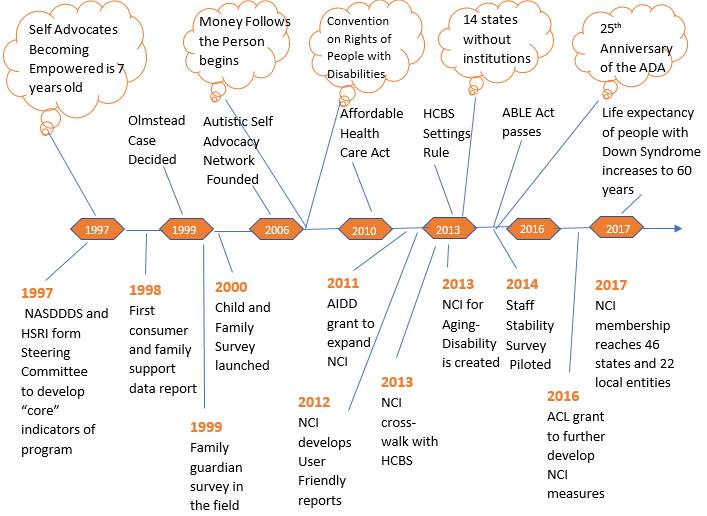Our Story
What is NCI-IDD?
National Core Indicators®-Intellectual and Developmental Disabilities (NCI®-IDD) was established in 1997. Formally known as just “NCI”, NCI-IDD supports National Association of State Directors of Developmental Disabilities Services (NASDDDS) member agencies to gather standard performance and outcome measures to track performance over time, compare results across states, and establish national benchmarks. Originally developed in the field of intellectual and developmental disabilities (IDD), today NCI (without “-IDD”) is an umbrella terms that refer to our performance measurement system that tracks progress toward person-centered outcomes in the fields of intellectual and developmental disabilities, aging and disabilities, and more.
Data generated by NCI-IDD is the largest collection of information on the outcomes of public IDD systems internationally.
By the late 1990s, the need for objective methods of benchmarking progress in our field had been building… States were spending more and more on long-term services and supports… and no single state had identified a way of answering the ultimate question: what are we getting for our financial investment?
Robert Gettings, former Executive Director at NASDDDS
Two Decades of Measuring the Performance of State Intellectual and Developmental Disabilities Systems
In the late 1990s, the need for objective methods of benchmarking progress in the field of long-term supports and services had been building for a number of years. In 1997, 15 states convened to discuss a potential performance measurement. There was considerable interest among states in identifying ways to objectively measure the quality and appropriateness of services in terms of the outcomes being achieved. Many states found their existing methods of assessing service quality based on input and process measures to be inadequate. Also lacking was a reliable way of comparing one state’s system-wide performance with those of other states. Ultimately, NASDDDS joined forces with HSRI to create a program in which interested states could develop and apply a common system of outcome and performance measures collaboratively, thereby sharing the required development costs and expertise. In 1997-98, a total of 5,426 service users and family members responded to the very first NCI-IDD surveys; by 2007-08, that number had grown to 25,918; in 2016-17, an estimated total of 36,400 responded to various NCI-IDD surveys.

Since its founding, the initial NCI-IDD cohort has expanded from 13 to 48 states, along with the District of Columbia and 21 regional developmental disabilities centers in California. NCI-IDD has also grown in its capacity to develop and administer surveys to measure performance of state aging and physical disability systems, measure outcomes experienced by families of people receiving IDD system services and assess the stability and quality of the workforce of direct support professionals. NCI-IDD data make it possible for participating states to track changes in performance, compare outcomes across states, and monitor national trends.
Creation of the collaborative was spurred by a number of changes to how data was collected, tracked, and used across states and agencies. First, at the helm of increasingly complex community systems, public managers in IDD sought ways to evaluate the performance and impact of their own IDD services. Second, improvements in technology made it possible to aggregate and analyze large datasets. Third, state IDD budgets had swelled as community systems expanded, thus expenditures needed to be justified through results. And lastly, more and more people saw the value of listening directly to the perspectives and opinions of people receiving supports; this opened the door for the use of a face-to-face surveys with people receiving services.
Housed in the Human Services Research Institute (HSRI), NCI-IDD is a voluntary activity and is primarily supported by state funds, Centers for Medicare and Medicaid Services (CMS), the Administration on Intellectual and Developmental Disabilities (AIDD), and the National Institute on Disability and Rehabilitation Research (NIDRR).

A one-page description about the initiative is also available for download.
Today NCI (without “-IDD”) is an umbrella terms that refer to our performance measurement system that tracks progress toward person-centered outcomes in the fields of intellectual and developmental disabilities, aging and disabilities, and more
Share this: